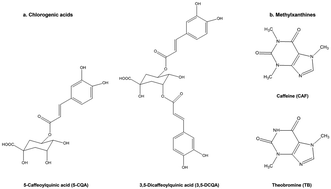Cardiovascular disease (CVD) is the major cause of morbidity and mortality worldwide. The consumption of a healthy diet rich in polyphenols has been inversely associated with the development of CVD. This study evaluated the effects of green coffee bean extract (GCBE) and yerba mate phenolic extract (YMPE), the main phenolic and methylxanthine constituents (5-caffeoylquinic acid, 3,5-dicaffeoylquinic acid, caffeine, and theobromine), and their main metabolites (caffeic acid, ferulic acid, dihydrocaffeic acid (DHCA) and dihydroferulic acid (DHFA)) on platelet activation in vitro. Upon incubation with different doses (0.01–100 μg mL−1 or μM) of each compound, adenosine 5′-diphosphate-induced P-selectin expression and fibrinogen binding were determined using whole blood flow cytometry. Platelet P-selectin expression was significantly decreased by YMPE and all phenolic and methylxanthine constituents at physiological concentrations, compared with control, whereas fibrinogen binding on platelets was significantly increased. The colonic metabolites (DHCA and DHFA) had stronger inhibitory effects on P-selectin expression than their phenolic precursors, suggesting an increase in the efficacy to modulate platelet activation with the metabolism of the phenolic compounds.

